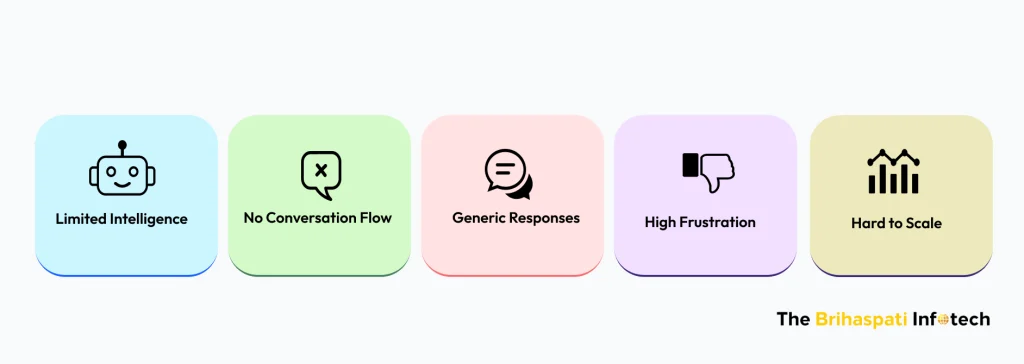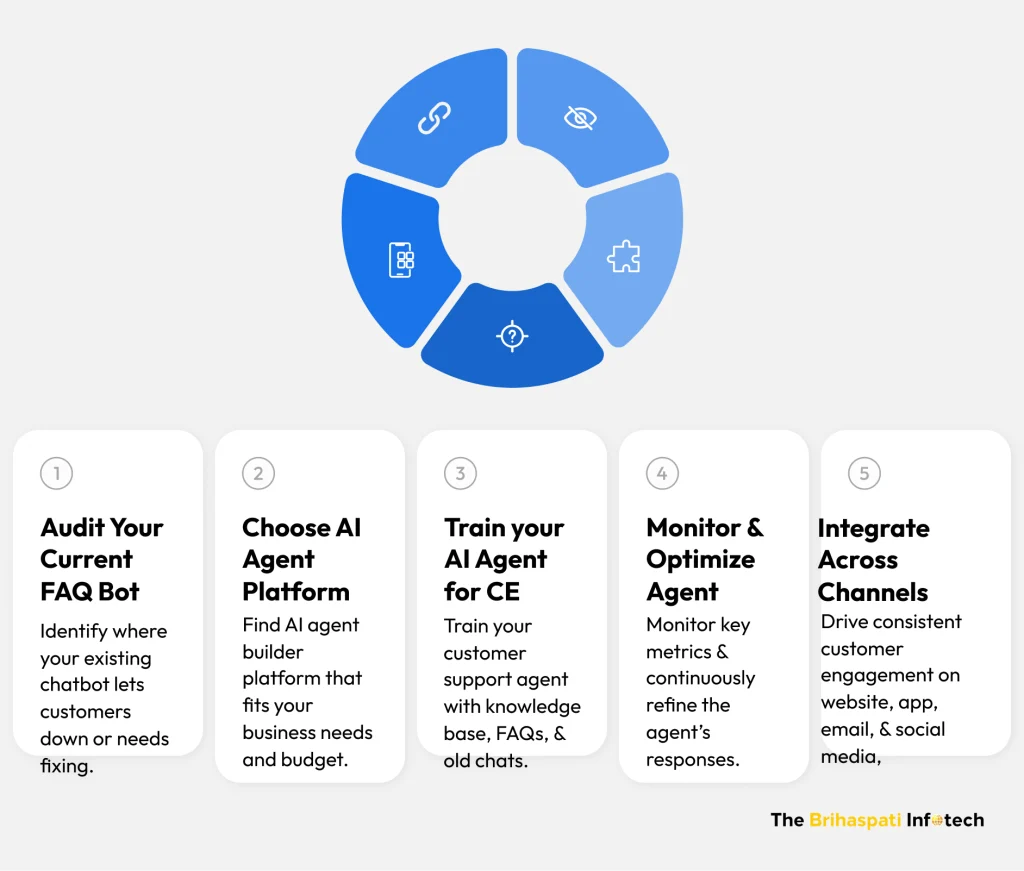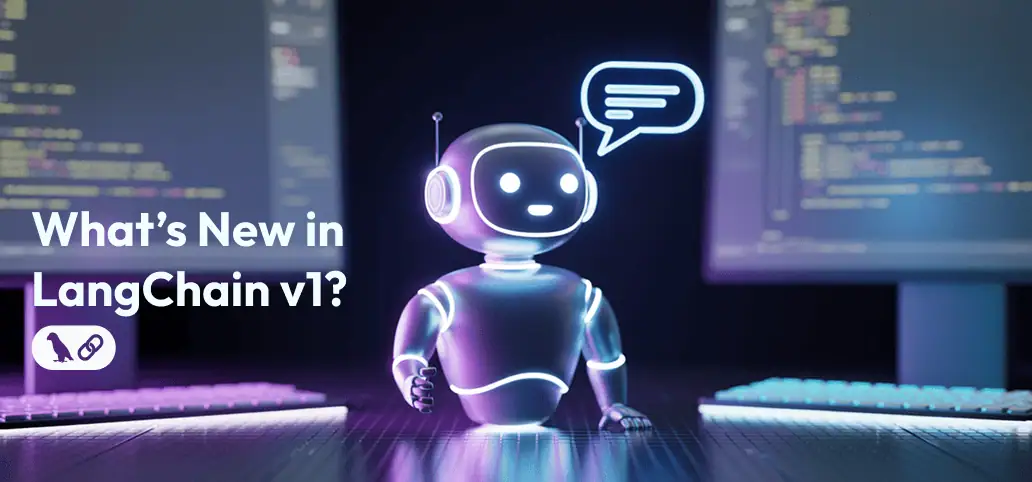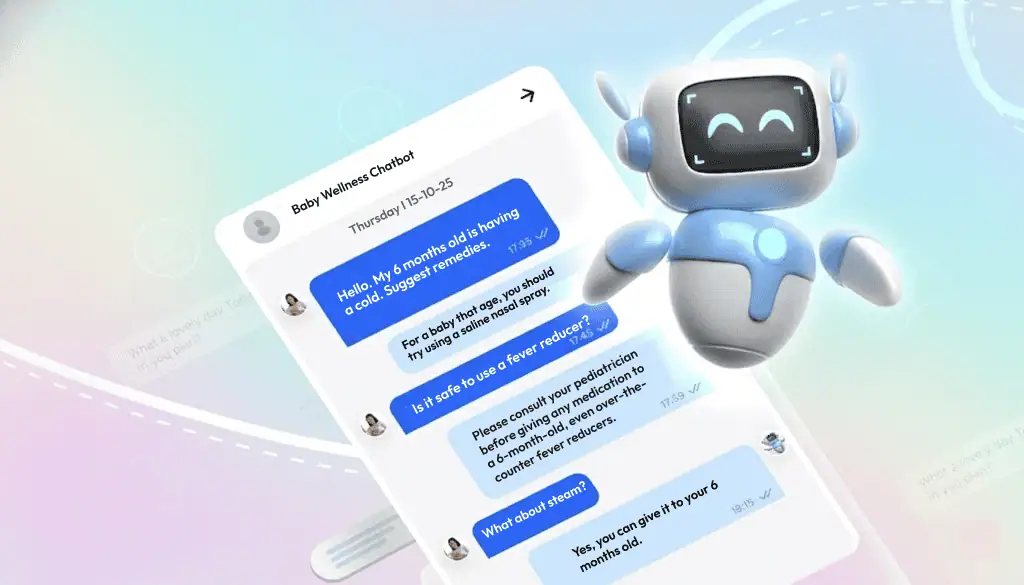
FAQ Chatbots Failing? Here’s How AI Agents for Customer Support Drive 10x Engagement
AI in customer support is evolving fast in 2025, and rule-based FAQ chatbots—those rigid, scripted tools—are failing to keep up. They frustrate customers with generic answers and broken conversations, driving most users away instead of engaging them.
Enter AI agents for customer support. Every conversation is a potential sales opportunity with AI agents. Powered by conversational AI, these smart agents understand user context, personalize interactions, and anticipate customer needs.
So, what next? Choose among top 10 agentic AI tools or hire AI experts to automate customer support of your business.
If you’re stuck with outdated chatbots or exploring AI agents for customer support, this guide is for you. We’ll explain why rule-based FAQ chatbots fail and how AI agents can elevate customer support for your business.
Let’s get started.
5 Reasons Why FAQ Chatbots Fail in 2025

Many companies use rule-based FAQ chatbots for customer support. These FAQ chatbots follow predefined scripts or “if-then” rules, offering quick answers for simple questions.
While they may seem efficient, FAQ chatbots often fall short in real-world interactions, resulting in customer frustration and disengagement.
1. Limited Intelligence
Rule-based chatbots depend on pre-built responses that match exact keywords or pre-set phrases. They can only answer pre-programmed questions.
However, they fail to answer complex or dynamic queries, leaving customers frustrated.
For example, if a customer types, “How do I track my order?” but the bot is programmed only to recognize “order status,” the interaction breaks down.
2. No Conversation Flow
Most chatbots cannot manage multi-turn conversations. If a customer asks follow-up questions, the chatbot often loses track and forces customers to exit. This breaks the flow of interaction, forcing customers to repeat themselves, abandon conversation, or call human agents.
Studies say 45% of users abandon bots that fail to answer their questions after 3 failed attempts.
3. Generic Responses
The quality of AI responses depends on the training data. If training data is biased or inadequate, rule-based chatbots may generate skewed results, affecting user interactions.
Research highlights that 40% of users abandon conversations when responses do not match their expectations. Without relevance, customer engagement drops, and conversion opportunities are lost.
4. High Frustration
Rule-based chatbots are meant to answer basic questions. They do not suggest relevant products or services to support their responses. Companies using only FAQ chatbots see engagement rates dropping below 20%, with limited upsell or cross-sell potential.
Let’s understand with a real-world case. AirAsia added conversational AI to their website and improved customer satisfaction from 60% to 90% and reported 8x increase in ancillary product up-sell/cross-sells.
5. Hard to Scale
Rule-based FAQ chatbots are reactive, rigid, and increasingly inadequate for modern customer engagement. Updating chatbots requires manual scripting for each new scenario. As businesses grow and FAQs evolve, maintaining these bots becomes increasingly complex and resource intensive.
Replace FAQ chatbots with AI agents for customer support and deliver the dynamic, engaging experience people expect in 2025.
The Role of Conversational AI in Customer Engagement
FAQ chatbots fail eCommerce businesses by delivering generic responses that result in cart abandonment and lost sales opportunities. Conversational AI solutions for eCommerce delivers human-like, scalable support.
Here’s how conversational AI chatbot development drives 10x user engagement:
- Instant Answers: Resolves queries like “Will this fit my style?” in real time, keeping shoppers engaged.
- Personalized Suggestions: Uses browsing history to recommend best-fit products for multiplying sales conversions.
- Dynamic Upselling: Suggests complementary items at checkout, increasing average order value.
- Scalable Tech Support: Handles thousands of chats during peak seasons without manual updates.
- Seamless Omnichannel: Delivers consistent experiences across website, app, and social platforms.
Ready to use conversational AI for eCommerce success? Build an AI chatbot or AI agents for customer support and success today.
What Are AI Agents & How They’re Different from FAQ Chatbots?
AI agents are software programs that can autonomously perform tasks to achieve specific business goals. As per Gartner, by 2029, AI agents will power 85% of customer interactions, signifying a substantial shift from traditional chatbots and human agents.
In customer support, AI agents interact with users, learns from data, and take action on behalf of your business. Unlike rule-based FAQ chatbots, they use NLP, machine learning, and predictive analytics to create incredible customer experiences that feel human.
AI agents drive 10x engagement by turning support into meaningful conversations through:
- Understanding Intent: They understand the meaning behind questions, ensuring accurate, natural responses that keep users engaged.
- Personalizing Interactions: Using customer data (like past purchases), they suggest relevant products or solutions, sparking interest and loyalty.
- Predicting User Needs: They proactively offer reminders or suggestions, reducing support requests and encouraging repeat visits.
- Seamless Omnichannel Support: They provide consistent support across web, app, email, and social, making every interaction smooth.
- Continuous Learning: They get smarter with every chat or conversation, refining answers to build trust and keep customers engaged.
AI Agent Vs Chatbots: The Comparison Table
AI agents unlike rule-based chatbots depend on conversational AI to understand language, respond appropriately, and maintain dialogue flow. Let’s figure out the difference between the two.
| Feature | Rule-Based FAQ Chatbots | AI Agents |
| Intelligence | Relies on predefined scripts and keyword matching, failing to answer complex queries (e.g., “track package”). | Uses NLP to understand user intent, providing accurate, human-like responses to complicated questions. |
| Conversation Flow | Resets after each question, breaking multi-turn conversations (e.g., fail to answer, “What about shoes?” after “How do I return a shirt?”). | Maintains context across follow-ups, ensuring seamless engaging interactions. Users do not have to repeat themselves. |
| Personalization | Offers generic responses without considering customer history, missing potential sales opportunities. | Uses customer data (e.g., browsing history) for tailored suggestions, amplifying user engagement. |
| Scalability | Requires manual script updates, slow and costly for growing FAQs or peak seasons. | Adapts automatically via continuous learning, effortlessly handling thousands of chats. |
| Sales Impact | Limited to basic query responses, leading to cart abandonment due to poor support. | Drives conversions with dynamic upselling and instant answers, reducing cart abandonment in eCommerce. |
How AI Agents Drive Customer Engagement by 10 Times?

AI agents for customer support do more than just answering questions. They engage and make connections that run deeper to drive business value. Here’s how they transform customer satisfaction, backed by real-world impact:
1. Faster Resolution Times
One of the most immediate benefits of AI agents for customer support is speed. Unlike rigid FAQ bots tethered to predefined scripts, these agents grasp context in real time, resolving issues on the spot.
Gartner predicts that agentic AI will autonomously handle 80% of common customer service issues without human intervention by 2029. That translates into faster resolution, saving adequate time for high-priority, strategic tasks.
Sephora, a leading beauty retailer, used an AI agent and reduced average response time from minutes to under 10 seconds and cart abandonment reduced by 18%.
2. Personalized Recommendations
Customer support AI agents use data—purchase history, preferences, and interaction patterns—to provide relevant, personalized suggestions. This level of personalization directly impacts both satisfaction and revenue.
A study by McKinsey found that 80% of businesses using AI for upsell and cross-sell opportunities experienced measurable revenue growth.
Amazon has set high benchmarks in personalized shopping experiences. Multiple reports credit its real-time recommendation engine for up to 35% of its total sales.
3. Continuous Learning
AI agents for customer support learn from every conversation. They identify patterns, feedback, and outcomes to refine their responses. This differentiates them from static chatbots that behave the same way regardless of new inputs.
IBM’s research shows that AI systems incorporating continuous learning deliver a median 30% boost in forecast accuracy within the first year.
Capital One’s Eno AI assistant exemplifies this through machine learning that deciphers behavior patterns, proactively flagging bill reminders or suspicious transactions. Over time, Eno now alerts users to trial endings, fostering greater trust and empowering millions to manage finances confidently.
4. Proactive Engagement
AI agents do not wait for customers to ask obvious questions. They can send reminders, updates, or suggestions based on behavior, reducing support load and improving retention.
Salesforce highlights how proactive AI engagement spots issues early, reducing churn and trimming inbound ticket volumes to sustain retention.
Starbucks uses AI in its mobile app to push behavior-based nudges, like custom drink promotions or rewards. Additionally, it forecasts customer traffic to ensure the store is prepared for every rush while minimizing waste.
5. Omnichannel Consistency
Customers interact with brands across multiple channels—web, app, social, and voice. AI agents maintain consistent, high-quality support across all touchpoints, enhancing the overall customer experience.
Forrester notes that brands using AI-enhanced omnichannel strategies can lift up to 20% while reducing costs 6–10%.
Nike uses AI agents across its app, website, and chat platforms, ensuring a seamless experience. Shoppers can pivot from app queries to social without restarts, yielding a 15% conversion rate jump and amplified loyalty through tailored, frictionless interactions.
Delivering this level of consistency requires agents that are resilient and production‑ready. LangChain v1 introduces durable workflows, middleware hooks, and structured outputs, ensuring omnichannel AI agents perform reliably across apps, web, and social platforms.
How to Implement AI Agents for Customer Support?

Implementing AI agents for customer support may seem daunting, but following these steps ensures success:
1. Audit Your Current FAQ Bot
Identify where your FAQ chatbot lets customers down. Is it missing key questions? Are users frustrated by robotic replies or long waits?
How to Do It:
- Dig into chat logs to find questions the bot can’t answer or where users drop off. For example, if customers ask about delivery times and get generic responses, that’s a failure point.
- Check metrics like how many queries go unanswered or escalate to human agents. Slow or irrelevant replies push customers away.
- List your top 20–50 FAQs and mark which ones cause issues, like vague answers or repeated questions.
2. Choose the Right AI Agent Platform
Look for platforms with advanced NLP capabilities, integration options, and analytics. Platforms like Dialogflow, Rasa, and LangChain-based solutions are popular for enterprise-grade AI agents in 2025.
How to Do It:
- For Non-Tech Solutions: Try no-code platforms like Tidio (automates FAQs with human-like responses) or Botpress.
- For Custom Development Solutions: Use LangChain or Dialogflow for enterprise-level business solutions.
- Look for platforms that connect to your systems (e.g., Shopify) and handle high traffic.
3. Train your AI Agent for Customer Support
Feed the AI your internal knowledge base, past FAQs, and conversation history. Ensure it can handle complex, multi-turn conversations.
How to Do It:
- Organize FAQs into clear question-answer pairs, like:
json
{
“question”: “How do I track my order?”,
“answer”: “Enter your order number in the tracking portal on our website.”
}
- Add past customer chats to teach the AI how people phrase questions differently (e.g., “Where’s my package?” vs. “How do I track?”).
- Train it to follow conversation flows. If a user asks, “How do I track my order?” then “What if it’s late?”, the AI should stay on topic.
- Enable continuous learning so the AI improves and gets smarter with each chat
4. Monitor and Optimize
Track how your AI agent performs and continuously refine the agent’s responses and behavior.
How to Do It:
- Measure engagement metrics: how fast it responds, how many questions it answers fully, and whether users stick around or leave.
- Look for frustration signals, like users repeating questions.
- Update the AI’s knowledge base with new questions or seasonal info, like holiday shipping details, to keep interactions relevant.
- Run A/B test to compare the AI agent with your old FAQ bot to ensure it’s driving more engagement.
5. Integrate Across Channels
Ensure your AI agent delivers consistent, engaging support on your website, app, email, and social media, unlike static FAQ chatbots.
How to Do It:
- Connect the AI to all platforms using tools like Botpress, which supports web widgets and social apps like WhatsApp.
- Keep conversations seamless. A user starting a chat on your website should continue on Instagram without restarting.
- Test for consistent tone and answers across channels to build trust and engagement.
Upgrading your FAQ chatbot to a powerful AI agent doesn’t have to be hard.
Start small and try AI agent builders available online. Or you can hire AI developers to build smart customer support agents for your business.
Overcoming Common Barriers to Adopting AI Agents for Customer Support
Worried about switching to an AI agent for customer engagement? You’re not alone. Many businesses hesitate for different reasons. Here’s how to effectively address some common challenges:
1. Expensive
Many AI agent builder platforms like Tidio offer affordable plans, with free trials and no upfront costs. Many businesses find the investment pays off quickly by reducing support tickets and increasing sales through personalized interactions.
2. Complicated
No-code platforms make setup as easy as dragging and dropping. You can have an AI agent running in hours, no coding needed. Or you can hire an AI developer immediately for custom development solutions.
3. Resource- Intensive
Start small and train your AI with just 20–50 FAQs and one channel (e.g., your website). Most platforms let you scale up later, so you see results fast without overhauling your support.
4. Relevancy
“Will It Work for My Business?” It is natural to be doubtful if exploring AI for customer support for the first time.
Whether you’re in retail, tech, or professional services, customer support AI agents adapt to your needs. They learn your customers’ questions and integrate with tools like Shopify or WooCommerce, ensuring relevant outcomes.
Start with any AI agent builder or consult a trusted AI development company like ours to scale your customer support services.
Frequently Asked Questions
Not always. Many AI platforms offer no-code setups. However, for complex integrations with CRM or ERP systems, hire AI developer support immediately.
Not entirely. AI agents for customer support can handle complex, dynamic user queries, enabling human agents to focus on high-value interactions. AI augments, not replaces, your support team.
Most businesses notice improvements in engagement and customer satisfaction within 2-4 weeks of implementation. However, the extract timeline is hard to predict.
Generally, businesses see a 2-3x ROI within six months of implementing AI agents. We recommend tracking key metrics like reduced resolution time, increased upsells, customer satisfaction scores, and lower churn rates.
Absolutely. Cloud-based AI agent solutions are scalable and affordable, making them accessible for businesses of all sizes.
Ready to Build AI Agents for Customer Support?
AI agents for customer support are a game-changer. They provide contextual understanding, personalized interactions, and proactive engagement. Businesses implementing AI agents can multiply customer engagement and improve satisfaction over months.
If your chatbot is failing, it’s time to upgrade with AI agents. They are not just a software tool. They offer a strategic advantage that drives business growth and brand loyalty.
Ready to switch to customer support AI agents? Consult a leading AI development company to evaluate your support strategy and adopt AI agents for customer support and engagement.
Stay Tuned for Latest Updates
Fill out the form to subscribe to our newsletter








